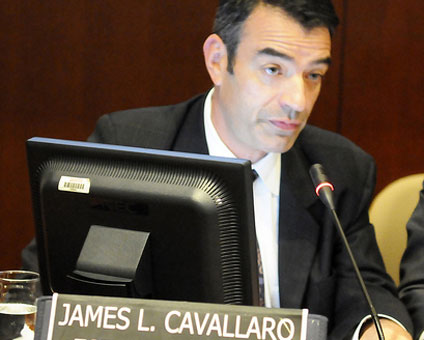Three new members will be elected to serve on the Inter-American Commission of Human Rights (IACHR) during the General Assembly of the Organization of American States (OAS) that will be held this June in Antigua, Guatemala. AQ interviewed James Cavallaro, professor of law and founder and director of Stanford Law School’s International Human Rights and Conflict Resolution Clinic, who is the U.S. candidate for the IACHR. The other five nominees are José de Jesús Orozco (México), Rodrigo Escobar Gil (Colombia), Javier de Belaúnde López de Romaña (Peru), Paulo Vannuchi (Brazil), and Erick Roberts Garcés (Ecuador).
AQ: Since the March 22 meeting in Washington DC ended without consensus on what should be the future of the IACHR, the floor is still open to discuss potential reforms. What was the main result of that meeting and its impact on the Inter-American System of Human Rights?
JAMES CAVALLARO: The meeting concluded with a resolution that is somewhere between the more extreme positions advocated by some of the member states. A modification proposed by Argentina allowed for continued discussion of the issues. Also, there was a section added at the end that will keep the issue of reform on the agenda of the Permanent Council.
There was certainly no decision made that would have limited significantly the autonomy of the Commission or altered the possibility of continued funding for some of the uses of the Commission. The resolution did not reach consensus on measures that would have involved significant change to the system, and the Commission will continue to be strong and valuable for the Americas. Although there was no consensus or closure on the debate, there was widespread recognition that the proposed modifications responded to issues raised over the course of the reform process.
In terms of the future of the system, some of the changes have been proposed with the goal of strengthening or perfecting the system. However, some of the proposals would undermine the Commission’s autonomy. Nevertheless, dialogue between states, civil society and the Commission is a potentially salutary process for an intergovernmental system. The important questions are: what are the terms of debate, what are the proposals and what are the bases for decisions?
AQ: Since many of the issues were not entirely resolved, what do you think will be the focus at the June OAS General Assembly?
CAVALLARO: I’m not sure how much of the reform agenda will be debated in Guatemala. There is a sense among some states that there are enough important issues—including the elections—that need to be decided at the meeting in June. So, these states think the reform process should not take center stage in Guatemala. The meeting will provide us with more elements to understand how the debate will continue, but it remains to be seen how central the reform process will be in June. A meeting scheduled in Cochabamba, Bolivia, on May 14 will include states that have ratified the Convention [American Convention on Human Rights]. That meeting will focus on most of the issues associated with the reform process.
AQ: The passive role of countries such as the U.S. has been criticized throughout this process. What should be the U.S. role in the coming months?
CAVALLARO: The United States has played an important role in seeking to maintain the Commission’s autonomy during the reform process. Its ability to be as strong an advocate as it could have been has been limited because it has not ratified the Convention. Other states have raised the issue of the U.S.’ non-ratification to question the U.S.’ role in the Commission, in general. I am critical of the U.S. position and I think it should ratify the Convention. Ratifying the Convention would provide greater force to U.S. efforts to maintain and strengthen the IACHR [Inter-American Commission of Human Rights]. The Commission will remain a multilateral forum whose states are able to take positions. Going forward, other states’ positions in the Commission should also be questioned, based on their actions.
AQ: You are one of the candidates for the IACHR. If selected, what would be your main priorities?
CAVALLARO: If I am fortunate enough to be elected, I would identify my priorities as strengthening the system within the context in which it finds itself. It is important for candidates and members of the Commission to recognize the political moment the system is undergoing now. I am a strong believer in the Commission’s role and importance in the Americas over the last 40 years—since the 1970s when it became a key actor. Now, the system is in a moment of very serious challenge and it is facing some potential threats. It is important that the Commission be strengthened—it must take measures to promote dialogue to ensure that it comes out stronger than when it began.
What does it need to do to make sure it is as relevant in the twenty-first century as it has been in the past? It will need to ensure engagement by all members and all parts of civil society. It will need to bring parties together and to approach things from the perspective of conflict resolution, rather than approaching things as a zero-sum game. And it will need to use its non-case resolution competencies more aggressively.
Follow our in-depth coverage of the OAS General Assembly here.





